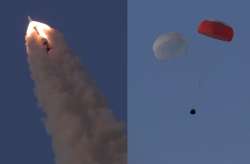ISRO successfully tests crew escape system for human spaceflight
The crew module reached an altitude of nearly 2.7 km under the power of its seven specifically designed quick acting solid motors to take away the crew module to a safe distance without exceeding the safe g-levels.

The Indian Space Research Organisation (ISRO) on Thursday carried out the first in a series of tests to qualify a Crew Escape System. The ISRO in a statement said the crew escape system is a critical technology for human spaceflight.
The Crew Escape System is an emergency escape measure designed to quickly pull the crew module along with the astronauts to a safe distance from the launch vehicle in the event of a launch abort. The first test (Pad Abort Test) demonstrated the safe recovery of the crew module in case of any exigency at the launch pad.
After a smooth countdown of 5 hours, the Crew Escape System along with the simulated crew module with a mass of 12.6 tonnes, lifted off at 07.00 AM (IST) at the opening of the launch window from its pad at Satish Dhawan Space Centre, Sriharikota today. The test was over in 259 seconds, during which the Crew Escape System along with crew module soared skyward, then arced out over the Bay of Bengal and floated back to Earth under its parachutes about 2.9 km from Sriharikota.
The crew module reached an altitude of nearly 2.7 km under the power of its seven specifically designed quick acting solid motors to take away the crew module to a safe distance without exceeding the safe g-levels. Nearly 300 sensors recorded various mission performance parameters during the test flight. Three recovery boats are being exercised to retrieve the module as part of the recovery protocol.